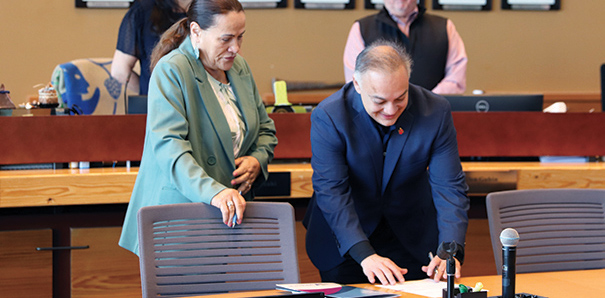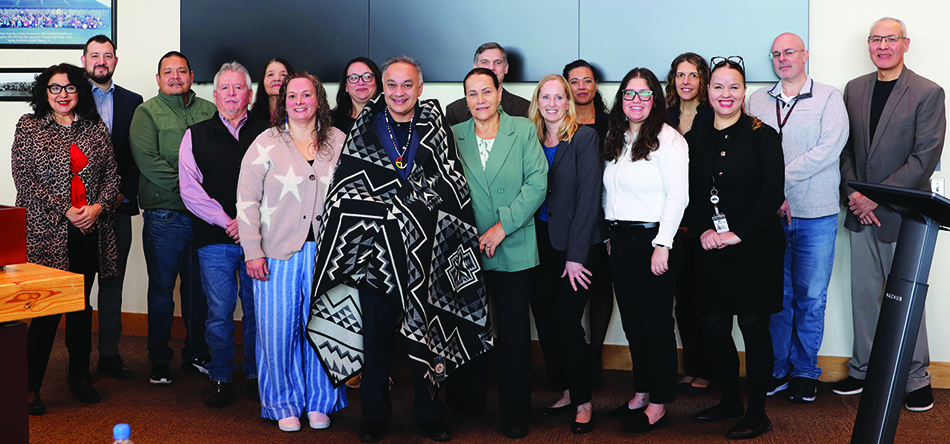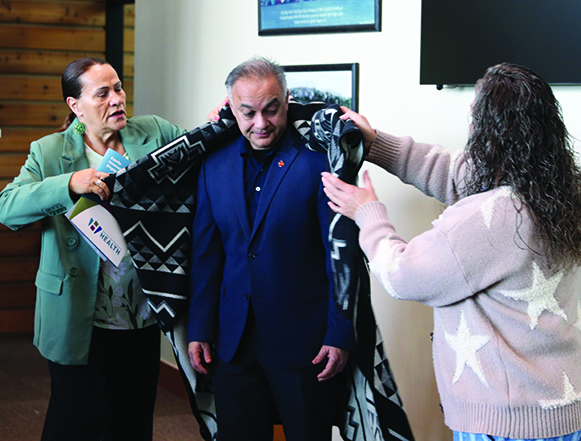
By Kalvin Valdillez, Tulalip News
January 9 marked a historic event and a win for tribal sovereignty. The Tulalip Board of Directors were joined by members of the Washington State Department of Health (DOH) and the Tribe’s data sovereignty service committee who worked together over the past two years to outline, define, and build upon an agreement in regard to tribal data in the state’s healthcare system.
This data sharing agreement allows Tulalip the ability to oversee the collection of data of its membership and determine how it is utilized to better inform the community in instances such as the spread of diseases, viruses, or any public health related issues occurring both on the reservation or throughout the region. It also provides an opportunity for the Tribe to address ongoing medical conditions within the community. And through the agreement, the Tribe will be notified when outside parties are looking to obtain the data of Tulalip tribal members and decide whether or not they give consent to the request.
Summer Hammons, Legislative Policy Analyst for Tulalip’s Treaty Rights & Government Affairs Office, shared, “It was a natural way to really try to understand sovereignty when outside agencies try to infiltrate tribal data. There was consultation going on with the Department of Health and tribes, but they also have tribal orgs that own epidemiology centers (TECs). And so, you have all these centers in Washington state that have access to our data, and we weren’t sure who was accessing our data at the state and federal level. We have data that’s stored in the tribal health clinic that could go to the national warehouse, so it’s more federal through an agreement that we have with IHS. On the state side, tribal members can go into Providence, or any hospital anywhere; all that data is stored in Washington State, especially contact tracing – Covid, sexually transmitted diseases. All that goes into the system for tracing. We didn’t know who’s accessing that specific data and we didn’t have access to that data.”
She continued, “It’s a way of protecting our data and for us to be at the table to look at that data and see what they’re doing. We also wanted to have a mechanism where we’re not blocking other people of data, because it’s really important for TECs to accumulate what’s going on with tribes. And we wanted to create a mechanism where the state can’t just give out our data without our permission or our informed consent.”

Summer went on to explain that though this specific agreement only affects the data protection and sharing of the Tulalip membership, it creates an opportunity for other tribes to formulate their own agreement with the DOH. With that in mind, they created a tribal data sovereignty committee where they collectively set out to define seven principals as a guideline, which includes the authority to manage tribal data, the right to give informed consent, and also equitable access to that data.
Said Summer, “We want to be able to tell our story and be able to access that data and tell the state if that’s not the story we want to send out. It’s important that there’s Tulalip data, but then it becomes aggregated, it becomes AI/AN (American Indian/Alaskan Native). Your tribal affiliation is removed on the report, and it becomes a statistic aggregated with all tribes. So, tribes need to know what you are doing with that aggregated data. That’s why we built the data sovereignty group, so that we know that before the DOH shares a campaign on something, that the tribes have consultation on it as well.”
On the morning of the momentous signing, the DOH Chief of Policy, Kristin Peterson expressed, “Thank you for inviting us to celebrate and honor this historic moment. Signing this agreement represents our commitment to our government-to-government relationship. Entering this agreement not only enhances Tulalip’s access to our data but upholds the DOH responsible for how we disclose and utilize Tulalip’s data. We are really excited about the signing and the work to come. And we are committed to making sure that once this is signed, the work is not over. We will hold ourselves accountable to implementing it.”
“This is not just a formal agreement,” added DOH Secretary, Dr. Umair Shah. “This is a journey we believe in so strongly. Why? Because when you share and provide data, when you give people access to their own data, that raises the visibility of health issues – the challenges and solutions that must be made. I cannot thank you enough for taking this journey with us. We could not have taken these steps without you, your leaders, your teams coming together to help us both understand the challenges and understand the concerns. We listened and we worked together through those challenges in order to come here today. And I’m so proud of the fact that we are here today.”

Following the signing of the agreement, the BOD blanketed Dr. Shah, thanking him for his years of service with the DOH. Each board member then shared a few words before the gathering concluded.
Secretary Theresa Sheldon, stated, “When we have these type of meetings where we’re signing MOUs, these are about lives. We are talking about lives and real issues, and the ability to address them in a timely manner, the ability to access care, and the ability to access resources that many times, we didn’t have. I’m really grateful for that. Our responsibility is the wellness of our people. That responsibility that we carry is much bigger than those in this room, because we are constantly looking out for the next seven generations, and the responsibility for their health and their wellbeing. Sometimes, Washington State is only friendly to us once we sue and win, because the law is on our side. Acknowledging that sovereignty and that authority is a constant battle. When we don’t have to do that and we’re able to work with employees who recognize that this is the right thing to do, it’s really appreciated.”